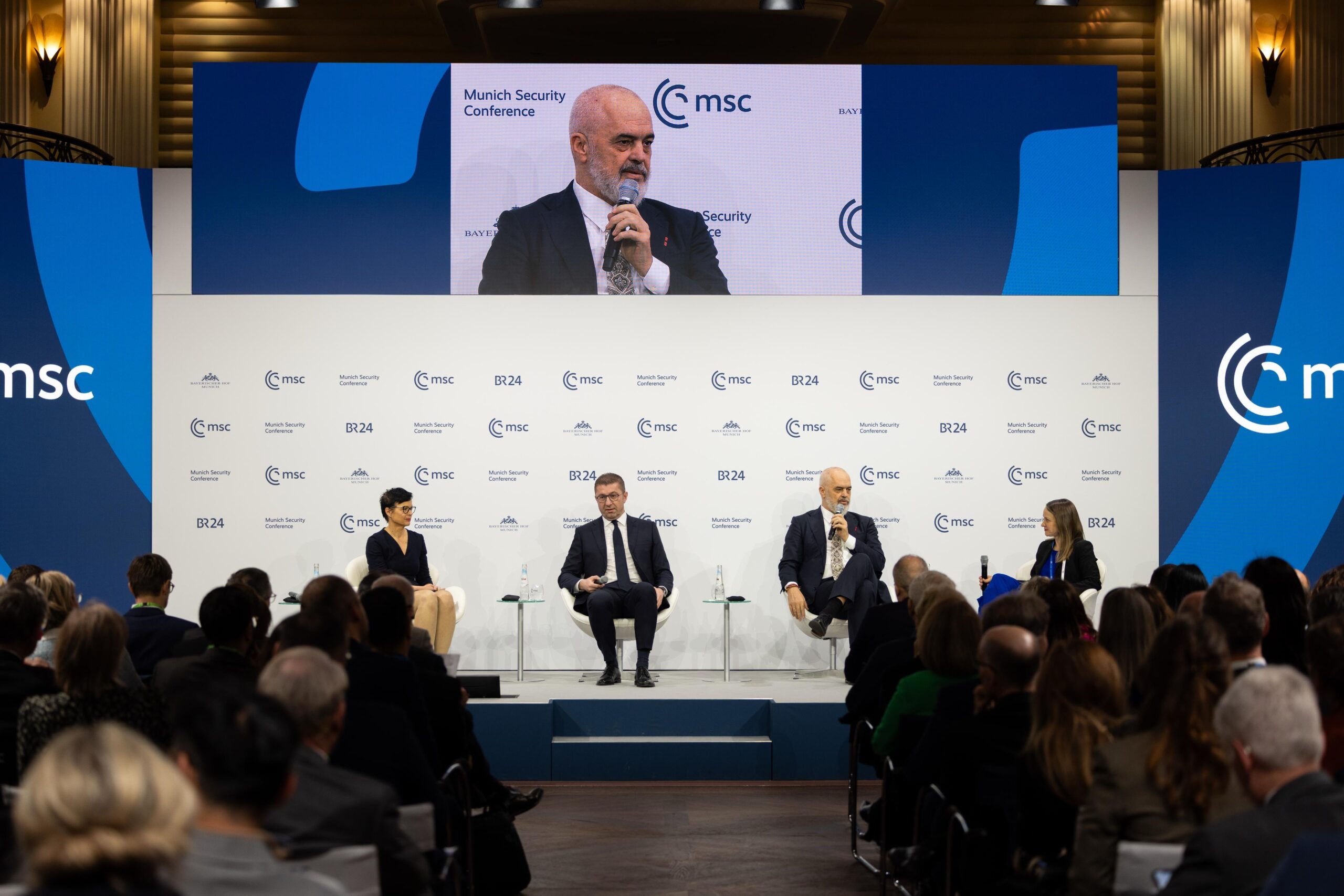Edi Rama at Munich Security Conference: EU must move faster on enlargement

Prime Minister Edi Rama participated in the “EU Enlargement” panel at the Munich Security Conference, alongside European Commissioner for Neighborhood and Enlargement Marta Kos and North Macedonian Prime Minister Hristijan Mickoski. The discussion focused on the urgency of EU enlargement amid growing geopolitical challenges, the role of the Western Balkans in the European economy, and the need for structural reforms within the EU itself. Rama pushed for a faster and more pragmatic integration process, arguing that the EU must adapt to global realities.
Why is this important: EU enlargement has long been a slow and complex process, with candidate countries like Albania and North Macedonia facing bureaucratic hurdles and political opposition from member states. While European Commission President Ursula von der Leyen has called for speeding up the process, deep divisions within the EU remain. With the 2026–2027 timeline now mentioned for Albania and Montenegro, the debate over balancing merit-based accession with geopolitical urgency is intensifying.
Context: The EU has historically approached enlargement cautiously, citing the need for candidate countries to meet strict political, economic, and legal criteria. However, Russia’s war in Ukraine has shifted priorities, with calls to integrate the Western Balkans, Ukraine, and Moldova more quickly. Rama, whose country has formally opened negotiations with the EU, has repeatedly expressed frustration with the slow pace of the process and has urged EU leaders to take a more strategic and forward-thinking approach.
What did he say: In the session, Rama argued that the EU’s slow decision-making process and excessive regulatory framework are holding back integration, particularly for the Western Balkans.
“There is a clear shift in how the EU views the Western Balkans, and the pace of integration has improved. But it is still happening far too slowly and far too little,” Rama stated, emphasizing that enlargement should not be treated as a “generous act” by wealthier EU states but as a strategic necessity.
He further argued that the EU must reconsider its criteria for enlargement, particularly in integrating candidate countries into the single market before granting them full voting rights in the European Council.
“The merit-based process should apply only to voting rights in the Council. It should not determine access to the single market or structural funds.”
EU’s and regulation: Rama also criticized the EU’s over-regulation, arguing that its bureaucratic approach is making European businesses less competitive compared to the US and China.
“America invented artificial intelligence, China copied it, and Europe—without even having it—rushed to regulate it.”
He called for a major shift in how the EU balances regulation with economic growth, warning that its inability to attract investment would weaken its global influence.
Trump and EU’s security dilemma: Rama described the reelection of Donald Trump as a wake-up call for Europe, urging EU leaders to take a more proactive stance on defense and economic strategy.
“Trump’s election would be the most generous act of God toward the EU—because it would force Europe to wake up.”
A stronger role for the Western Balkans: Rama argued that the Western Balkans should be seen as an opportunity, not a burden, for the EU. He called for more European investment in the region and criticized the idea that enlargement is purely an act of solidarity from richer EU states.
“Today, the EU needs us more than we need the EU. Believe me on this.”
What else: European Commissioner Marta Kos, while acknowledging Rama’s concerns, reaffirmed the EU’s commitment to a merit-based enlargement process. She suggested that Albania and Montenegro could complete accession negotiations by 2026–2027, provided they continue implementing reforms.
“During my mandate, I expect at least two or three countries to complete accession talks. Based on merit, Albania and Montenegro are in the lead.”
However, she also warned that EU member states must first agree on institutional and financial reforms before enlargement can proceed smoothly. With Albania and Montenegro now considered frontrunners for accession, the coming years will test whether the EU is truly willing to match its words with action. If enlargement continues at a sluggish pace, the credibility of the EU’s geopolitical ambitions will be called into question.


